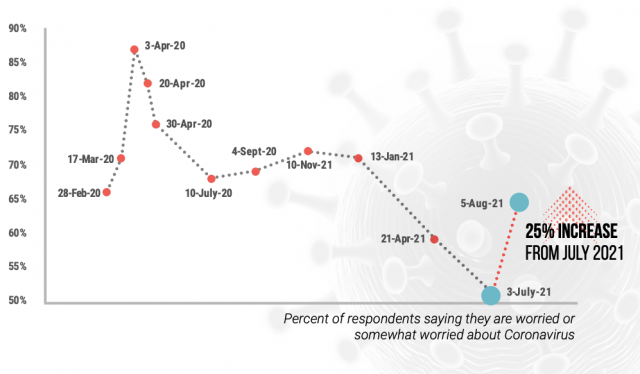PITTSBURGH — U.S. consumer confidence is waning because of the rise of the Delta variant, a new consumer survey conducted last week by First Insight has found.
The survey saw a 25% increase since July 2021 in the number of consumers admitting that they are “very or somewhat worried” about the Coronavirus, up from 51% to 64%. That is the highest one-month jump recorded since March 2020. The recent findings further indicate that more than half (56%) of the consumers surveyed last week will be cutting back on their spending, an increase of 8% over last month.
 The survey also suggests that boosting vaccination rates among those who have not gotten shots already may not offer an easy exit from the pandemic in the United States.
The survey also suggests that boosting vaccination rates among those who have not gotten shots already may not offer an easy exit from the pandemic in the United States.
Of the survey respondents who were unwilling to get vaccinated, 90% of them said that they don’t expect to change their minds because of pressure from businesses.
“It is very telling that a mere 10% of respondents say they would consider getting the vaccine due to some businesses and restaurants requiring proof of vaccination,” said First Insight CEO Greg Petro. “It appears that people’s minds are made up about whether to get vaccinated and more education may be required to change their minds. Hopefully, we will spend the time and effort to do so for everyone’s sake, thus allowing everyone to make his or her own, educated choice.”
Since the onset of the Coronavirus pandemic, First Insight has been engaged in a longitudinal study, polling more than 10,000 American consumers in total balanced across gender, geography and generations to gauge their overall concern about the virus, how COVID-19 will affect their spending, and whether the vaccine’s availability would alter their shopping behavior. This most recent study was fielded on August 5.
Notably, as the back-to-school shopping season kicks into high gear, safety concerns around in-store shopping have also increased over the past month. Fifty-three percent of respondents report that they feel unsafe trying on products in dressing rooms, 49 percent feel unsafe trying on shoes, and 71 percent feel unsafe testing beauty products in store. Fifty-six percent of respondents stated they feel unsafe working with a sales associate, a 30% increase from last month. However, this is not necessarily bad news for retail, as online shopping continues to rise, even at lower, single-digit growth rates than during the height of the pandemic.
“I believe the trends we’re seeing may very well lead to families hunkering down again and curtailing experiential spending, especially for domestic and international travel, and shifting this spend toward physical products, including back to school items,” Petro said. “Interestingly, women, the primary back-to-school shoppers, are significantly less likely to be vaccinated than men, with fully one-third of women stating that they don’t intend to be vaccinated vs. only 18% of men. Further, Millennials, the generation most likely to have school-age children, are also the least likely generation to be vaccinated.”
Restaurants and travel will also be affected by the increase in concern over the spread of the Delta variant. Two-thirds of those surveyed have said that they won’t go to restaurants or are cutting back significantly on dining out. Forty-four percent have canceled trips due to recent COVID-19 changes, and 65% have said that they won’t travel internationally. Furthermore, more than half (53%) have said that their return-to-work plans have changed.




You must be logged in to post a comment Login